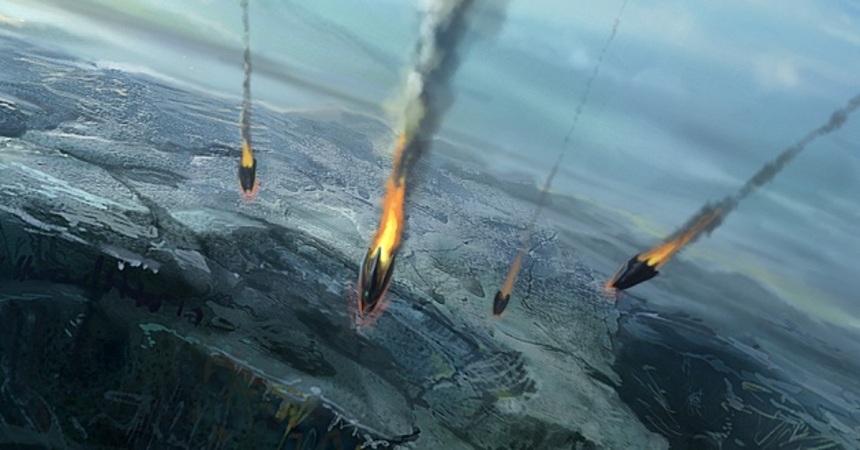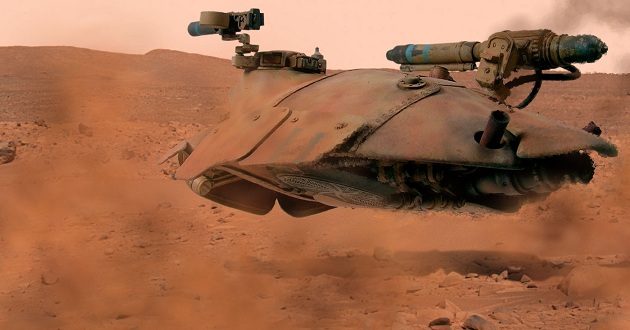Books to be Scene: Walter Jon Williams' HARD WIRED

Flaming corn-alcohol throbs through [Cowboy's] chest like blood and the shrieking exhaust flows from his lungs like breath, his eyes beam radar and his fingers can flick missiles forth like pebbles. Through his sensors he can taste the exhaust and see the sky and the prairie sunset, and part of his mind can feel the throbbing radio energies that are the enemy's search planes, and it seems to him that the watchers and the escort vehicles are suddenly lessened - he will be taking the panzer over the Line, and they will not...Of all the holy texts of classic science fiction, those books devoted nerds dream of seeing brought to the big screen, William Gibson's Neuromancer (1984) has to be pretty high up the list. The man practically invented cyberpunk as a genre - that strange fusion of golden age sci-fi with the tropes of counterculture movements down the ages - and influenced countless authors with the sheer scope of his vision, the sense he'd laid down a template for a whole parallel reality as much as he'd written a novel that caught hold of your imagination.
The beast roars like the last lonely dinosaur and trembles as it gains way. Mental indicators climb their columns from blue to green to orange. Ripe wheat straw flies out behind in a plume. Cowboy has a steel guitar playing a lonesome cadenza somewhere in his mind. He cranks up the flame and is doing over a hundred when he blazes through some poor citizen's bobwire and crosses the Line.
There were a few abortive attempts at filming Neuromancer over the years: Gibson even wrote a pretty decent treatment of the novel himself. It's not hard to imagine why the book spent so long in development hell - you'd need a fair amount of money to do justice to what was something of an unproven property back then, and after the godawful, tone-deaf adaptation of Gibson's Johnny Mnemonic his relationship with Hollywood probably didn't get much better. Yet let me suggest it's probably not such a bad thing the project, while supposedly still in the works, has yet to come to fruition.
What's so bad about Neuromancer, then?
Neuromancer is far more deserving of praise as a cultural milestone than a work of fiction. That's not to say it's a bad book - it's anything but, obviously, a solid, very well-written thriller that changed the face of science fiction - but strip away the staggering level of invention behind the world-building and the story doesn't quite rate the hyperbole the name attracts. A tortured noir hero takes on one last job under duress to try and rid himself of his demons; throw in a femme fatale, conflicted loyalties, a soupcon of philosophical meandering and you've pretty much summed it up. Gibson even called it "an adolescent's book" at one point
It's the weakest novel by far in the trilogy it kicks off (along with Count Zero and Mona Lisa Overdrive) and there's very little of the nuance or lyricism of Gibson's later, more reflective novels like All Tomorrow's Parties or Pattern Recognition (this last is also supposedly in development, and I pray to God it doesn't get butchered). There's some terrific set pieces and great characterisation in Neuromancer, but Gibson's use of action and narrative arcs isn't anything like as revolutionary as his universe was. The atmosphere he creates with a legion of the damned wryly surrendering to the inevitable is fun, but hardly puts you on the edge of your seat.
You think you can name someone who's done any better?
Can and will. Walter Jon Williams' Hardwired (1986) is clearly cut from much the same cloth as Gibson's early work, as in it's yet another piece of dystopian SF where a renegade hero struggles through day-to-day life trying not to get ground down by the Man. Anguished lovers meet-cute, part, meet up again. Shit occasionally blows up reeeal good. But where Gibson drew heavily from the genre archetypes established by others before him, there's a desperate sadness to Hardwired almost completely lacking in Neuromancer, a quality that makes the twists, the character flaws and the explosions that much more affecting.
Williams' universe sees an Earth firmly under the thumb, when corporate armies from orbital stations circling the planet have crushed any significant resistance in a short, sharp, bloody little war and left the surface to be carved up between puppet governments jockeying for favours and the few remaining rebels trying to live free against the odds. Two of these last get caught up in a plan to turn the tables on one of the corporations' lackeys, a plan which swiftly turns into something grander once they realise how badly the deck's been stacked against them.

Who are these two desperadoes?
Cowboy is a smuggler, running contraband through the blockades set up by earth authorities and the corporations' private armies. Sarah is a mercenary, an assassin for hire trying to piece together the scratch to get herself and her brother off-planet. When Cowboy's efforts to level the playing field attract enough corporate interest he rates a bodyguard, Sarah gets the job, but it soon becomes apparent they're in as much danger from her old enemies as they are from his current opposition.
Hardwired, like Neuromancer, makes for a terrific thriller. The main action sequences centre on Cowboy, either behind the wheel of his signature hovertank or in flight, and Williams' aerial combat in particular is possessed of a staggering amount of suspense as well as an exhilarating, breathless joy, like Miyazaki if he lived for seeing things explode. There's a dynamic, freewheeling quality to Williams' prose in these moments, a use of motion and evocative metaphor that would translate fantastically well into visuals in the right hands.
Pretty pictures, then. Big whoop.
Yes, but it's the character development that really gives this stuff some proper dramatic weight. For all Gibson's often-stated interest in how technological advances change us, Neuromancer's cast don't seem to have evolved too far past the basic archetypes they originally sprang from. The thing about an awful lot of noir - even many stories commonly acknowledged as classics of the genre - is the hero frequently lives in the author's world, understands it, but he never feels like a part of it. He knows how the game will turn out, and he can't seriously bring himself to care.
Ironic detachment is still artifice of a sort, however beautifully written, and you get so used to this it's a genuine shock to realise that Cowboy and Sarah actually seem like they give a damn. They drag themselves into the fray one more time because they're good people, not because that's what a noir demands its heroes do. They know the odds are insurmountable, but they want to succeed badly enough they don't care. They can't bear the thought of what would happen if they failed, whether it's the world at stake or just their nearest and dearest.
It's not like that's never been done -
Less often than you might think. Either way there is nothing in Neuromancer to rival one beautiful, terrible moment late in Hardwired where a character stands ready to throw themselves into the eye of the storm, so to speak, and you know they won't be coming back out. More than twenty-five years on it is still heart-stoppingly good, the kind of high drama that'd make this an actors' film as much as a visual spectacle. And there are some wonderful moments of moral ambiguity that challenge your whole interpretation of the heroes' journey - not quite up to Peking Opera Blues' masterful true ending (my go-to example for these things) but definitely in the same ballpark.
Williams' writing tends to get a tad purple at times, and there are passages where his book does date painfully: the love scenes in particular are just shy of moonlight falling through the blinds and an overblown sax solo. All the better to try the story in a different medium, though, play up that sadness through an empty prairie or a clear blue sky. Neuromancer will never live up to people's expectations by this point; if anyone was actually going to shoot this kind of story, better to pick something that'd exceed them, surely? I have no idea who'd want to make The Wild Bunch meets Serenity, but if they ever did I refuse to believe I'd be the only one picking my jaw off the floor.
Hard Wired, by Walter Jon Williams, is currently available as an ebook. Original paper- and hardback copies can be had second-hand, though often at vastly inflated prices.
The existing cover art for Hard Wired would make your eyes bleed, so images are concept art for the forthcoming videogame Stellar Dawn, and retouched images of a completed model kit from artist Fichtenfoo.

Do you feel this content is inappropriate or infringes upon your rights? Click here to report it, or see our DMCA policy.






